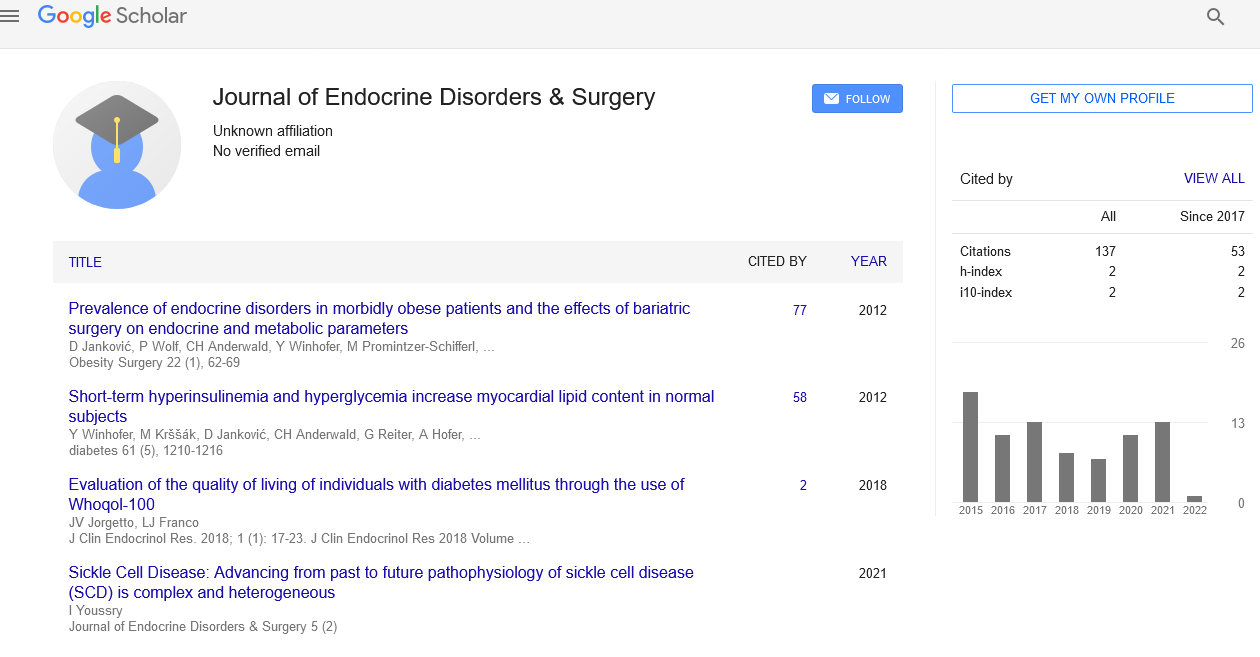Undertreated Hypothyroidism
Received: 04-Dec-2022, Manuscript No. puljeds-23-6209; Editor assigned: 06-Dec-2022, Pre QC No. puljeds-23-6209 (PQ); Accepted Date: Dec 23, 2022; Reviewed: 10-Dec-2022 QC No. puljeds-23-6209 (Q); Revised: 12-Dec-2022, Manuscript No. puljeds-23-6209 (R); Published: 30-Dec-2022, DOI: 10.37532/puljds.2022.6(6).04
Citation: James A. Undertreated hypothyroidism. J. Endocr Disord Surg. 2022;6(6):04.
This open-access article is distributed under the terms of the Creative Commons Attribution Non-Commercial License (CC BY-NC) (http://creativecommons.org/licenses/by-nc/4.0/), which permits reuse, distribution and reproduction of the article, provided that the original work is properly cited and the reuse is restricted to noncommercial purposes. For commercial reuse, contact reprints@pulsus.com
Abstract
Patients with hypothyroidism who do not receive adequate thyroid hormone replacement therapy may experience worse hospital results, such as increased readmission rates and lengthier hospital stays.
Key Words
Hypothyroidism; Levothyroxine
Introduction
Due to the rising incidence and prevalence of autoimmune thyroiditis that comes with ageing, hypothyroidism is more prevalent in the elderly. Due to a number of factors, including a relative lack of referable symptoms, confounding findings that may be related to coexisting disorders, changes in thyroid hormone levels that may be related to nonthyroidal illness, and upward shifts in TSH levels that may occur with normal ageing, accurately diagnosing this condition in the elderly may be difficult. Age-related changes in thyroid hormone metabolism and possible drug interactions must be taken into account when treating hypothyroidism in the elderly. Reduced risks of atrial arrhythmias and progressive bone loss may be linked to iatrogenic thyrotoxicosis, which is brought on by overtreating with excessive amounts of levothyroxine. The frequency and incidence of hypothyroidism rises among the elderly. It's critical for clinicians to understand some elements of hypothyroidism in older people. In the presence of somatic complaints and other aging-related conditions, its clinical manifestations might be less apparent. The existence of nonthyroidal illness may affect how a thyroid function test is interpreted. Due to variations in the metabolic clearance of thyroid hormone, drug interactions, and possible side effects, special considerations may be necessary when designing a treatment plan.
Levothyroxine (L-T4) is one of the most commonly prescribed medications because hypothyroidism is a fairly prevalent dysfunction. The amount of L-T4 that is given is absorbed to about 70%. The tiny intestine serves as the site of absorption. Some gastrointestinal conditions, as well as some medications, dietary supplements, and beverages, result in L-T4 malabsorption, which prevents blood TSH levels from being normal. Rarely is liver fibrosis cited as a contributing factor in L-T4 malabsorption. TSH levels cannot be relied upon to accurately direct Thyroid Hormone replacement therapy in individuals with Central Hypothyroidism. Guidelines recommend substituting doses of 1.2 g/kg–1.6 g/kg body weight, striving for free thyroxine (fT4) levels that are in the upper range of normal previous to intake. Contrary to patients with primary hypothyroidism, patients with CHT still run the risk of improper substitution due to variations in TH metabolism, concurrent treatments, and incorrect TSH interpretation.
Up to 5% of the general populace has hypothyroidism, and an additional 5% is thought to go undiagnosed. Over 99% of those who are impacted have primary hypothyroidism. The most frequent cause of all thyroid conditions, including hypothyroidism, is environmental iodine shortage worldwide, but in regions where iodine is abundant, the most frequent cause of thyroid failure is Hashimoto's disease. With overt primary hypothyroidism being described as serum Thyroid-Stimulating Hormone (TSH) concentrations above and thyroxine concentrations below the normal reference range, hypothyroidism is diagnosed biochemically. While the effects of untreated or inadequately managed hypothyroidism include cardiovascular disease and increased mortality, the symptoms of hypothyroidism are non-specific and include mild to moderate weight gain, fatigue, poor focus, depression, and irregular menstruation.
One of the most commonly given medications in the world, levothyroxine, has long been the primary method for treating hypothyroidism. Levothyroxine is typically given to adults with overt hypothyroidism at a starting dose of 1.6 g/kg/day, which is then titrated to achieve ideal TSH levels (0.4-4.0 mIU/L), in accordance with the therapeutic goal.Levothyroxine is typically given to treat hypothyroidism, one of the most prevalent diseases in the world. When the thyroid gland, which is located in the neck, is unable to create enough thyroid hormone to meet the needs of the body, hypothyroidism results. Heart illness, infertility, and subpar child brain development can be outcomes of this. Hypothyroidism can affect a person's quality of life by causing weight shifts, fatigue, weakness, and depressive symptoms. The primary cause of hypothyroidism in underdeveloped regions of the globe is an insufficient intake of iodine from food. As a result, many nations attempt to boost iodine intake by iodizing salt. Hashimoto's disease is the most prevalent cause of hypothyroidism in regions of the globe where people consume adequate amounts of iodine. This inflammatory condition causes the thyroid gland to be attacked by immune system cells and antibodies.





